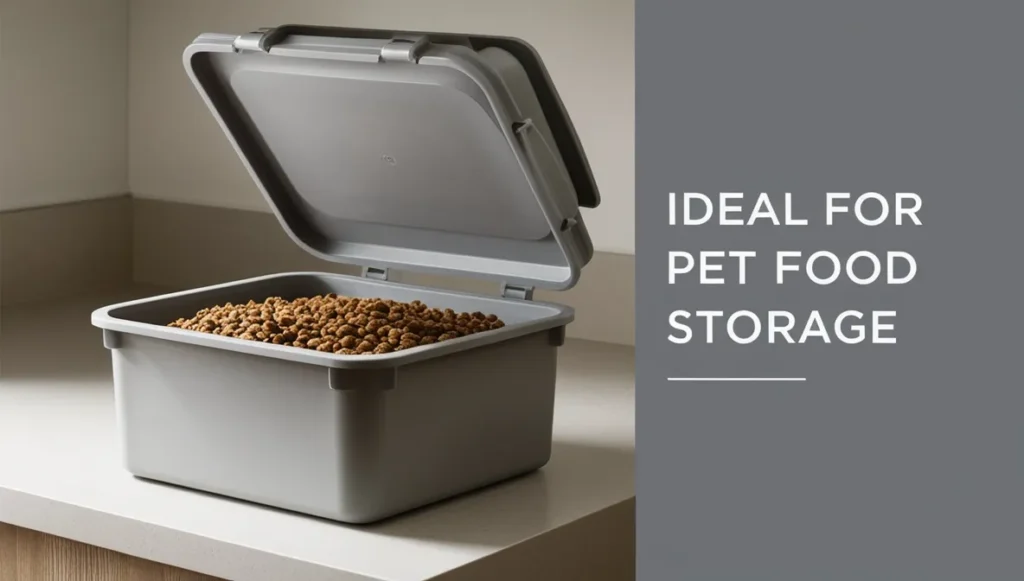When it comes to versatile, durable, and cost-effective storage options, HDPE stackable containers are a game-changer. These containers have become increasingly popular across various industries, from food and beverage to pharmaceuticals and pet care, thanks to their practicality and eco-friendly composition. But what exactly makes them so special, and why are they an excellent choice for businesses and individuals alike? In this article, we’ll dive deep into the world of HDPE stackable containers, exploring their benefits, common applications, and why they stand out in the market.
What Are HDPE Stackable Containers?
HDPE (High-Density Polyethylene) stackable containers are storage or transport solutions made from a durable and recyclable plastic material. These containers are specifically designed to stack securely on top of each other, maximizing space efficiency without compromising safety or stability.
Their robust construction, resistance to chemicals, and lightweight design make them ideal for a variety of uses, from storing dog food and pet accessories to industrial and warehouse applications.
Why Choose HDPE Stackable Containers?
HDPE stackable containers offer several advantages over other materials like metal, glass, or traditional plastics. Here’s why they stand out:
| Feature | Benefit |
|---|---|
| Durable and Long-lasting | Resistant to impact, cracking, and wear, ensuring years of use. |
| Eco-Friendly | Made from recyclable materials, reducing environmental impact. |
| Lightweight | Easy to handle and transport, even when full. |
| Chemical Resistance | Can safely store chemicals, oils, and other hazardous materials. |
| Space-Saving Design | Stackable to save valuable space in storage or during transportation. |
| Food-Safe Options | HDPE is FDA-approved for food contact, making it ideal for pet food storage. |
Applications of HDPE Stackable Containers
HDPE stackable containers are incredibly versatile, making them suitable for various industries and personal uses. Let’s explore some common applications:
1. Pet Care Industry
Dog owners and businesses in the pet care industry use HDPE containers for:
- Dog Food Storage: HDPE containers keep food fresh, dry, and pest-free.
- Accessory Organization: Store toys, grooming tools, and leashes.
- Transportation Needs: Ideal for safely transporting items during pet shows or events.
2. Food and Beverage Industry
These containers are widely used for:
- Ingredient Storage: Ensures food safety and protects against contamination.
- Beverage Handling: Stores syrups, concentrates, and even water.
3. Industrial Use
For factories and warehouses, HDPE containers are indispensable:
- Chemical Storage: Resistant to corrosion and chemical reactions.
- Parts Organization: Keeps tools and small components sorted and accessible.
4. Household Use
In homes, these containers prove to be practical for:
- Garage Storage: Organizing tools, paint cans, and hardware.
- Recycling Bins: Sturdy and easy to clean, perfect for waste segregation.
Also Read: How is HDPE Pipe Most Commonly Joined
Key Features to Look for in HDPE Stackable Containers
When choosing the right HDPE stackable containers, consider the following:
| Feature | Why It Matters |
|---|---|
| Load Capacity | Ensures the container can safely hold the required weight. |
| Stacking Ability | Look for a secure design to prevent tipping during stacking. |
| Ventilation Options | Ideal for storing perishable items or preventing moisture buildup. |
| Size Variations | Available in multiple dimensions to suit specific needs. |
| Sealing Mechanisms | Airtight lids for storing sensitive or food-grade materials. |
How to Maintain and Clean HDPE Stackable Containers
Proper maintenance ensures the longevity of HDPE containers. Follow these steps:
- Regular Cleaning: Use warm soapy water or a mild detergent. Avoid abrasive cleaners that can scratch the surface.
- Sanitizing: For food-related use, sanitize containers with a solution of water and vinegar or a food-safe sanitizer.
- Storage: Keep containers in a dry, cool area to prevent warping. Avoid prolonged exposure to direct sunlight.
- Inspection: Periodically check for cracks or damage that could compromise functionality.
FAQs About HDPE Stackable Containers
1. What is HDPE, and why is it used for containers?
HDPE stands for High-Density Polyethylene, a durable, lightweight, and recyclable plastic. It’s ideal for containers because of its strength, chemical resistance, and eco-friendliness.
2. Are HDPE stackable containers safe for food storage?
Yes, most HDPE containers are FDA-approved for food storage. They are non-toxic, do not leach chemicals, and are resistant to moisture.
3. How much weight can an HDPE stackable container hold?
The load capacity varies by container size and design. Most can hold between 50 to 300 pounds, depending on the model.
4. Can I use HDPE containers outdoors?
Yes, but prolonged exposure to UV light may degrade the material. If outdoor use is necessary, look for UV-resistant HDPE containers.
5. Are HDPE stackable containers eco-friendly?
Absolutely! HDPE is 100% recyclable, and many manufacturers use recycled HDPE to produce new containers.
6. How do I know which size HDPE container to choose?
Consider your storage needs, available space, and the type of items you’ll be storing. Many manufacturers provide size guides for reference.
Final Thoughts
HDPE stackable containers offer an unbeatable combination of durability, versatility, and sustainability, making them the perfect storage solution for businesses and individuals. Whether you’re a dog owner looking for safe and practical pet food storage or a warehouse manager seeking efficient organization, these containers deliver unmatched value.
By understanding their features, applications, and maintenance needs, you can make an informed decision that suits your requirements. Embrace the practicality of HDPE stackable containers and transform your storage solutions today!
